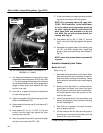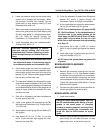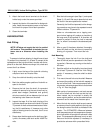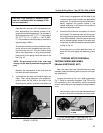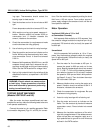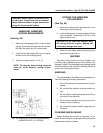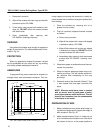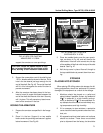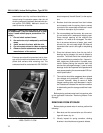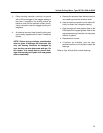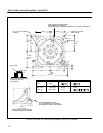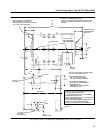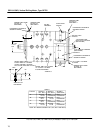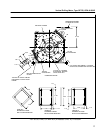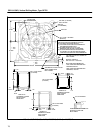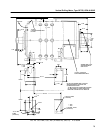
GEK–91584D, Vertical Drilling Motor, Type GE752
72
examined for rust. Any rust found should be re-
moved using fine abrasive paper, after the old
slushing compound has been removed with min-
eral spirits (GE–D5B8). Methanol should be
used to remove all residue.
WARNING: Cleaning solvents may be toxic and/
or inflammable. They can cause serious or fatal
injury if used without proper precautions. For
safety:
1. Do not inhale solvent fumes.
2. Use solvents only in adequately ventilated
areas.
3. Avoid contact of solvent with the skin.
4. Do not expose solvent to flame or sparks.
5. Observe caution statements issued by the
manufacturer of the solvent.
Extreme care should be exercised not to dam-
age critical machined surfaces such as the ta-
pered shaft surface while removing rust. The
surfaces should be reslushed with GE–D6C6A1
FIG. 47. SHIPPING BOX WITH ARMATURE,
LESS COVER. E–3784.
slush compound, Kendell Grade 5, or the equiva-
lent.
4. Brushes should be removed from their holders
and clamped under the spring clips to prevent
corrosion of the commutator surface as a result
of moisture absorption by the carbon.
5. Do not completely seal the motor, but cover ma-
jor vent areas with a waterproof shipping tape.
Leave enough opening so the machine can
breathe – i.e., moist air is not trapped. The inten-
tion is to prevent entrance of water, dust, small
animals, etc., but not to seal airtight. GE does not
recommend the use of a silica gel or dehydrating
agent.
6. Since the lubricant drains from the top half of
bearings during storage, this area is subject to
corrosion. The shaft should be rotated periodi-
cally to redistribute a protective film. If stored in-
side, rotate every three months. If outside, every
month. Before placing the machine back into
service after prolonged storage (1 year or more)
bearings should be inspected and repacked with
new grease meeting the recommended GE lubri-
cation specification.
7. The machine should be meggered when placed
into storage and periodically while in storage
(3–month intervals). Keep a record of these
megger readings as a rapid decrease in insula-
tion resistance indicates the machine condition
is deteriorating and the storage conditions inade-
quate.
Before placing a stored motor back into service, refer
to the applicable instruction “Removing Motors From
Storage”.
REMOVING FROM STORAGE
Before placing a stored motor in service, perform the
following:
1. Blow dust and dirt accumulation out of the wind-
ings with clean, dry air.
2. Visually inspect for spring corrosion, sticking
brushes in brushholders and general defects.



